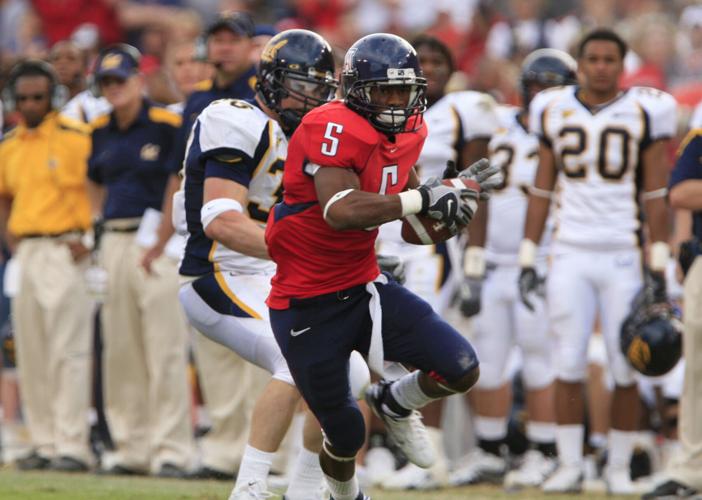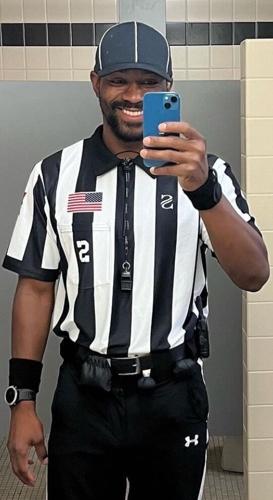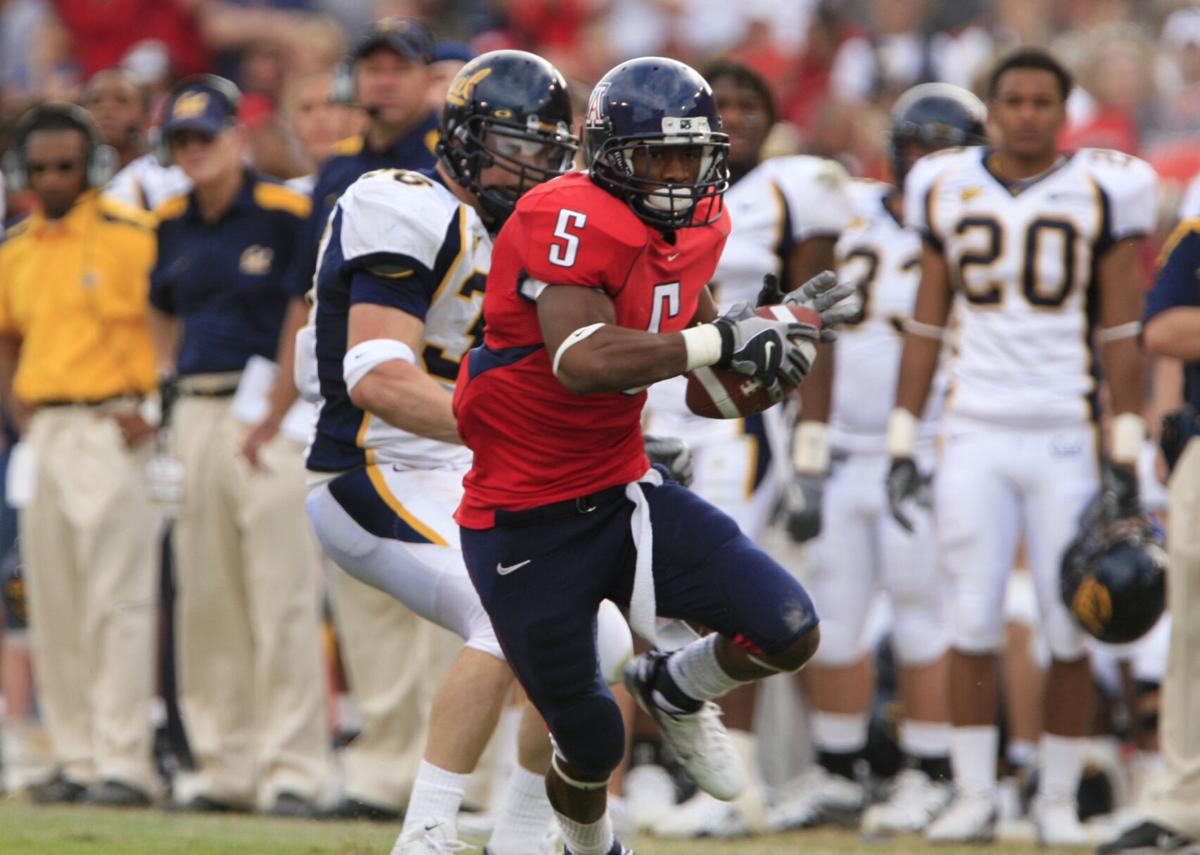When it comes to Arizona-Cal football lore, Antoine Cason’s game-winning touchdown in 2006 will always be among the most memorable plays.
Cason returned an interception 39 yards for a touchdown to lift the Wildcats to a 24-20 win over the eighth-ranked Golden Bears in 2006. It was one of the top upsets of the Mike Stoops era — and just another nail-biting finish in the head-to-head series between Cal and Arizona.
Cason became a first-round draft pick of the then-San Diego Chargers in 2008, and played seven seasons in the league.
After retiring, Cason wanted to stay in football. He worked as a television analyst, made a push for the vacant Arizona coaching job in 2020, and has now taken on a new passion — officiating.
Cason, 36, is working Los Angeles-area high school football games and Los Angeles Chargers practices.
“Once I started to do it, I realized, ‘Wow, I get to come to the stadium, dress, warm up and do everything else around the game. The grass on the field, I still smell it. The band is still playing. Only difference is that I’m not putting on pads anymore, so this is the closest thing I have to be on the field,” Cason said. “It was either coaching or officiating — and I’m not into getting fired for coaching.”
Cason joined ESPN Tucson’s “Spears and Ali” earlier this week to talk about Arizona’s win over Cal in 2006 — and his new job.
How do you reflect on playing against Cal in 2006, considering the Bears were ranked in the top 10?
A: “Playing Cal at that time, Cal was always in the top 15 — top 20? — the years I was there. My freshman year was in 2004, when Aaron Rodgers was the quarterback at Cal, so they always had pretty good teams. Being able to have five interceptions in four years, I feel like I own Cal. But that year in particular (2006), they came in hot. They had a punt return for a touchdown, it was about 95 yards in the beginning of the game. Who catches it at the five-yard line and scores? Well, they had a guy (DeSean Jackson) who could do that. At halftime, we were losing and it didn’t look good. A few things went our way, and that play, I was in Cover 4 and I had no business being down there to make that play but, as they say, I had a hunch. That’s what my mindset was: just make a play, and that’s how that happened.”
Where does Jackson rank among receivers you covered at Arizona?
A: “He’s pretty high up there, because he ran short routes and long routes. He was fast, pretty quick, confident and carried that swagger that you knew if you played against him, you had to bring your A-game. Us growing up in the same city, I was familiar with him. I can’t speak for him, but I’m sure he knew I was going to come ready to play. He’s ranked very high on the receivers I had to cover.”
As a play-making defensive back, how do you balance doing your job and not letting anything get behind you but at the same time taking that risk every once in a while like your pick-six against Cal?
A: “I talk to young athletes all the time, we have to have a level of ‘Eff-it’ in us. What level of ‘Eff-it’ are you going to implement — and at what time? I watched a lot of film. I was fortunate to have coaches who put together a really good game plan. … Being able to figure out when and where their offense was going to make that type of play. I based my level of ‘Eff-it’ on the statistics and what I saw. ‘OK, they’ve run this play already a couple times, and this quarterback has thrown the checkdown every single time.’ So when it came time to make a play, I felt comfortable in saying ‘Eff-it,’ and taking that risk, so it’s more of a calculated risk, but there’s still some ‘Eff-it’ involved, because I was supposed to be in the deep quarters.”

Smile! Antoine Cason, taking a selfie in his referee's uniform, works Los Angeles-area high school games and Los Angeles Chargers practices.
And now you’re implementing ‘ref-it’ into your life.…
A: “I’m putting a little ref-it into it, but that aspect, I can’t have any ‘Eff-it.’ I have to make sure that call is what it is. That’s been very fun. To be back on the field in a different way — like, I don’t feel any of the pressure of playing. You know how you get out there and you’re just super nervous? When I’m out on the field officiating, I’m not nervous. I have a good idea of what I’m looking at. They’re only going to call so many plays and so many formations, and once I see it in the beginning of the game, I have a great idea of who they’re going to throw to, what area of the field they’re going to run, and officiating the game on that. It helps my eyes be in the right place. The biggest thing for me is making sure to understand the mechanics and the exact letter of the rule.”
What are your interactions with players during games?
A: “I reffed a game about a year and a half ago, when I first started, and I threw back-to-back pass interference penalties. They were pass interferences, and it sucks to throw back-to-back flags for pass interference, but that’s what it was. That kid on the field, it was funny: he told me, ‘Dang ref, that was a terrible call, you need to turn in your whistle. How did you even get to be a ref?’”
And what was your response?
A: “I told him, ‘You need to turn in your technique. If I gotta turn in my whistle, you gotta turn in your technique, because that was pass interference.”
When you were a player, did you ever interact with officials during games?
A: “I did, moreso when I got to the pros. I would talk to the officials more and it wasn’t like they were helping me out, but I would get better feedback and better response talking to them than yelling at them. … I didn’t get many penalties, probably because I talked to them in that way and they helped me with the rules.”
What led you to becoming an official?
A: “I went to a friend’s birthday party. Mike Carey, the longtime official, he was at the same birthday party. We were just talking and he was talking about the game, and I asked him questions about what led him to officiating. It circled all the way back to, ‘Hey, you love being on the field and love the game still, why don’t you try officiating? Have you ever thought of that?’ I was like, ‘Nah, not really, but OK.’ So, he put me in touch with the NFL people and told the association out here in Southern California and Long Beach, and that’s how I got into it.”






